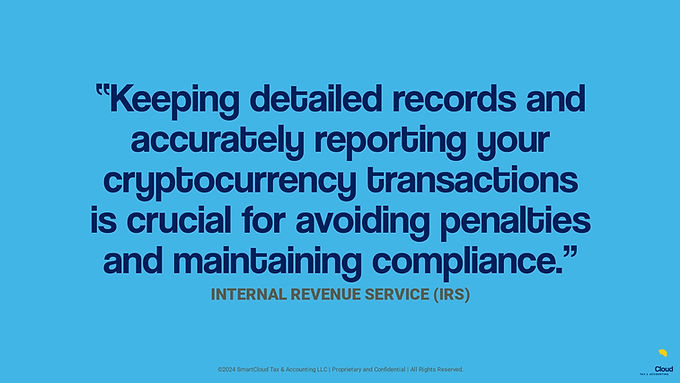MYTH :
You Don’t Have to Pay Taxes on Cryptocurrency

REALITY :
Cryptocurrency transactions are taxable. This includes trading, spending, or earning crypto as income.
HOW WE KNOW :
IRS guidelines and notices explicitly state that cryptocurrency is taxable.
KEY TAKEAWAYS :
Taxable Transactions: Cryptocurrency transactions are taxable and must be reported to the IRS.
Variety of Transactions: Different types of cryptocurrency transactions, including selling, trading, and using crypto for purchases, have tax implications.
Stay Informed: Understanding the tax rules for cryptocurrency is crucial for accurate tax filings and avoiding penalties.

One common tax myth is the belief that you don’t have to pay taxes on cryptocurrency transactions. This misconception can lead to significant compliance issues and potential penalties from the IRS. Here's what you need to know to stay compliant and avoid these pitfalls.
Origin of the Myth
Perceived Anonymity: Many people believe that the decentralized and often anonymous nature of cryptocurrency transactions exempts them from tax reporting.
Lack of Awareness: There is often confusion about the specific tax rules that apply to cryptocurrency transactions.
Reality of Cryptocurrency Taxation
Taxable Transactions: The IRS considers cryptocurrency to be property, and as such, most cryptocurrency transactions are taxable events.
Selling Cryptocurrency: When you sell cryptocurrency for cash, you must report any gains or losses.
Trading Cryptocurrency: Trading one cryptocurrency for another is considered a taxable event.
Using Cryptocurrency for Purchases: Using cryptocurrency to buy goods or services is also a taxable event.
Mining and Staking: Income from mining or staking cryptocurrency must be reported as taxable income.
IRS Guidelines on Cryptocurrency
Form 8949: Use Form 8949 to report capital gains and losses from cryptocurrency transactions.
Schedule D: Summarize the totals from Form 8949 on Schedule D (Form 1040).
Income Reporting: Report income from mining, staking, or receiving cryptocurrency as payment on your tax return.
Fair Market Value: Calculate gains or losses based on the fair market value of the cryptocurrency at the time of the transaction.
Why the Myth Persists
General Misconceptions: Many taxpayers believe that cryptocurrency is not subject to the same tax rules as traditional assets.
Anecdotal Advice: Misleading information and advice from non-professional sources perpetuate the myth.
Avoiding the Pitfall
Understand the Rules: Clearly understand the IRS rules for cryptocurrency transactions.
Taxable Events: Recognize that selling, trading, and using cryptocurrency are all taxable events.
Reporting Requirements: Ensure you accurately report all cryptocurrency transactions.
What You Need to Do
Keep Detailed Records: Maintain accurate records of all cryptocurrency transactions, including dates, amounts, and fair market values.
Use Appropriate Forms: Report your transactions using Form 8949 and Schedule D.
Report Income: Include income from mining, staking, or receiving cryptocurrency as payment on your tax return.
Consulting a Tax Professional
Seek Professional Advice: Consulting a tax professional can ensure you correctly identify and report all cryptocurrency transactions.
Accurate Records: A professional can help you maintain proper documentation and navigate the complexities of cryptocurrency taxation.

